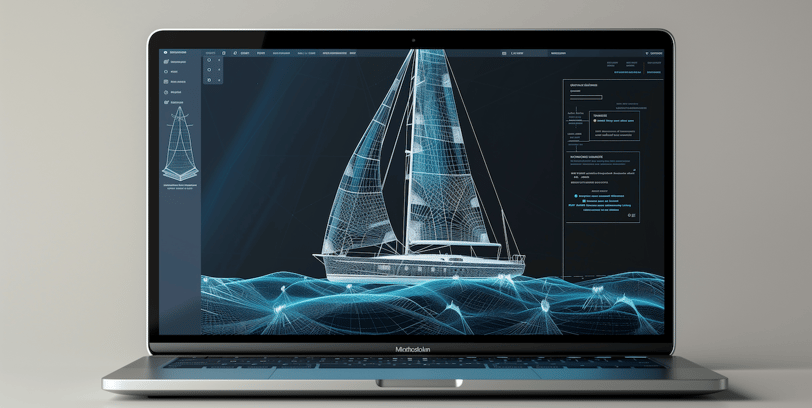
The Advantages of E-Learning


In a world driven by technology, the maritime industry is setting sail into a new era of learning through maritime e-learning programs. This innovative approach to education offers numerous advantages, catering to the needs of aspiring sailors, seasoned mariners, and maritime enthusiasts alike. In this post, we'll explore the benefits of maritime e-learning and highlight some of the most popular courses available.


Advantages of Maritime E-Learning:
Flexibility and Accessibility: Maritime e-learning breaks down geographical barriers, allowing individuals to access courses from anywhere in the world. Whether you're a working professional, a student, or someone with a busy schedule, e-learning provides the flexibility to study at your own pace.
Cost-Effectiveness: Traditional maritime education can be costly, involving expenses for travel, accommodation, and materials. E-learning eliminates these overheads, offering a cost-effective alternative without compromising the quality of education.
Interactive Learning Modules: Maritime e-learning courses often incorporate interactive modules, simulations, and multimedia resources. This immersive approach enhances the learning experience, making complex topics such as navigation, seamanship, and maritime law more engaging and accessible.
24/7 Availability: With e-learning, there are no fixed class schedules. Courses are available 24/7, allowing individuals to study at their convenience. This flexibility is particularly beneficial for those working irregular hours or in different time zones.
Expert Instructors and Industry Insights: E-learning platforms bring together seasoned maritime professionals and industry experts as instructors. Learners benefit from real-world insights, practical tips, and the latest industry knowledge, ensuring that the education provided is both relevant and up-to-date.


Popular Maritime E-Learning Courses:
Navigation and Seamanship Essentials: A comprehensive course covering the fundamentals of navigation, chart reading, and essential seamanship skills. Ideal for beginners and those looking to refresh their knowledge.
Marine Engineering Basics: This course delves into the principles of marine engineering, covering topics such as engine maintenance, propulsion systems, and troubleshooting common issues on board.
Safety at Sea Certification: Focused on maritime safety protocols, this course equips learners with the knowledge and skills needed to ensure the well-being of the crew and vessel in various situations.
Yacht Chartering and Management: Tailored for those interested in the business side of yachting, this course explores the ins and outs of yacht chartering, management, and the legal aspects of maritime business.
Celestial Navigation Masterclass: For the adventurous sailor, this course teaches the art of celestial navigation, enabling mariners to navigate using the sun, moon, stars, and planets.


Several well-known online platforms offer maritime courses, covering a wide range of topics from navigation and seamanship to marine engineering and safety at sea.
Here are some of the prominent online platforms that provide reputable maritime courses:
Marine Online: Marine Online offers a variety of maritime courses, including navigation, safety, and certification programs. They collaborate with industry experts and institutions to provide comprehensive training for maritime professionals.
Lloyd's Maritime Academy: Lloyd's Maritime Academy provides a range of online courses covering maritime law, navigation, marine engineering, and more. They are known for offering courses developed in collaboration with industry experts and recognized institutions.
MIT OpenCourseWare - Nautical Science and Engineering: Massachusetts Institute of Technology (MIT) offers free online courses through MIT OpenCourseWare, covering topics such as ocean engineering, marine navigation, and naval architecture. While not for certification, these courses provide valuable knowledge.
Seagull Maritime: Seagull Maritime offers a selection of online courses and training modules for seafarers, covering various aspects of maritime skills, safety, and regulations. They focus on enhancing the competence of maritime professionals.
Warsash Maritime Academy - Solent Online Learning: Warsash Maritime Academy, part of Solent University in the UK, offers online courses in maritime studies, including navigation, marine engineering, and ship management. These courses are developed with industry standards in mind.
IMO e-Learning: The International Maritime Organization (IMO) provides e-learning courses on their platform, covering topics related to international shipping regulations, safety, and environmental protection. These courses are especially valuable for those in the maritime industry.
Naval Education and Training Command (NETC): The U.S. Navy's Naval Education and Training Command offers various online courses for naval and maritime professionals, covering navigation, seamanship, and related subjects.
Udemy: Udemy hosts a variety of maritime courses created by different instructors. While the quality may vary, it's a platform where you can find affordable courses on topics such as navigation, marine engineering, and safety at sea.
When considering online maritime courses, always ensure that the courses are recognized or accredited by relevant maritime authorities or organizations, depending on your career goals and requirements. Additionally, check reviews and testimonials to gauge the effectiveness and quality of the courses.


More online platforms
Udemy: Udemy is a widely recognized online learning platform that hosts a diverse range of courses created by individual instructors. In the case of maritime courses on Udemy, you can find offerings on navigation, seamanship, marine engineering, and safety at sea. These courses vary in terms of content, quality, and instructor expertise, so it's essential to read reviews and check the credentials of the instructors before enrolling.
Coursera: Coursera collaborates with universities and institutions worldwide to offer online courses on a wide array of subjects, including maritime studies. Courses on Coursera often have a structured format, with video lectures, quizzes, and assignments. They may also offer certification or even degree programs. Check the platform for maritime courses from renowned institutions.
edX: Similar to Coursera, edX partners with universities and organizations to deliver online courses. You can find maritime-related courses covering navigation, marine engineering, and maritime law. edX courses often have a more academic focus, and some may offer certificates or even academic credits upon completion.
Skillshare: Skillshare is known for offering a variety of creative and practical courses. While not as specialized in maritime education, Skillshare may have courses related to sailing, navigation, or other maritime topics. These courses are often created by industry professionals or enthusiasts and may offer a more hands-on and creative approach to learning.
Remember that the availability of maritime courses can change, and new courses may be added over time. Always check the latest offers on each platform, read reviews, and consider the specific focus and expertise of the instructors before enrolling in any course. Additionally, verify if the courses meet any certification or recognition requirements you may have for your maritime career.
In conclusion, maritime e-learning offers a flexible, cost-effective, and interactive approach to education in the nautical world. With a myriad of courses catering to different interests and expertise levels, individuals can chart their own course to success in the maritime industry. Embrace the future of maritime education and set sail towards a brighter and more knowledgeable seafaring journey.
